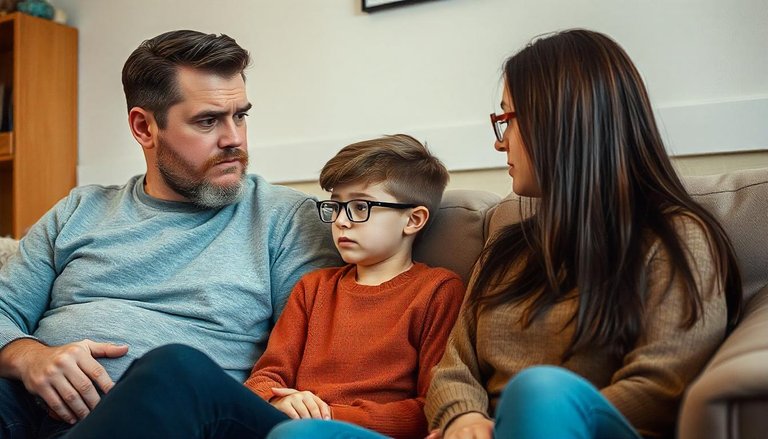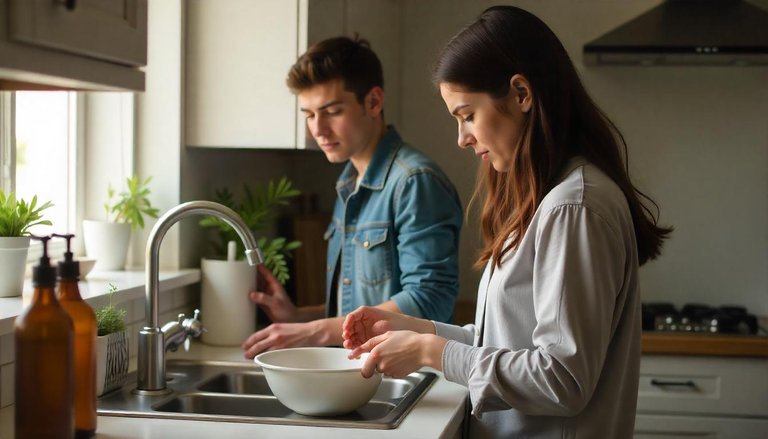The past few weeks have been challenging with our children. Both have faced difficulties in various aspects of their lives. As they grow and their temperaments evolve, we as parents have found ourselves seeking knowledge to understand how to best support them through these new stages. I've learned some wonderful new things and thought it would be beneficial to share them with the community, as they have been incredibly helpful for us as parents.
De la pedagogía a la hebegogía | Adaptando nuestra comunicación para forjar un mejor temperamento en mi hijo
Han sido semanas difíciles con nuestros hijos, ambos han tenido desafíos en distintos ámbitos de su vida, crecen y sus temperamentos cambian y como padres nos hemos visto en la necesidad de buscar conocimiento para saber como ayudarles a enfrentar estas nuevas etapas. He aprendido cosas nuevas y maravillosas, por lo tanto, pense que seria ideal compartirlas con la comunidad, porque pueden resultar favorables para otros, como lo han sido para nosotros como padres.

My older son has exhibited a noticeable change in behavior recently. Within a matter of days, he seemed like a completely different person. Initially, I was unsure what kind of change he was going through, but after talking to him and analyzing what he told me, I did some research to better understand what was happening. That's when I realized that he was experiencing a change in temperament, the way he naturally reacts to everyday situations.
Mi hijo mayor a mostrado un cambio en su comportamiento recientemente, en cuestion de dias parece otra persona, al principio ni sabia que tipo de cambio estaba sufriendo, pero luego de hablar con el y analizar lo que me dijo, con la información recabada, me documenté para aproximarme lo mas que pudiera a definirse lo que le pasa. Fue así como llegue a la conclusión que se trataba de un cambio de temperamento, la forma en cómo reacciona naturalmente a las situaciones de su dia a dia.
While he can't control what affects him, he can control how he reacts. This is where our role as parents begins, to help him figure out how to do that. After several conversations, we offered him the best advice we could. He seemed satisfied with our talk and decided to act on the new information he had received. However, after a while, he came back to us still struggling, not applying what we thought he had already understood.
Lo que le afecta, no lo puede controlar, lo que si puede hacer es controlar cómo reacciona, es ahí donde inicia nuestra labor de padres para ayudarle a dilucidar la manera. Tras varias conversaciones, le dimos los mejores consejos que pudimos, le vimos satisfecho tras nuestra conversación y tomo la decisión de actuar en base a la nueva información que recibió, sin embargo, luego de un tiempo volvió a nosotros aun afectado, sin aplicar lo que creíamos ya había asimilado.

These kinds of situations test our patience. As parents, knowing how to react to these situations is crucial. Personally, I try not to be reactive. I don't always have the answer right away, so I try to listen and ask for time to think about how I can help. Sometimes I fail with this method and say the first thing that comes to mind, which is wrong. But something that has helped me is understanding that, depending on the stage of life our child is in, they learn differently. I need to adjust my teaching accordingly.
Este tipo de situaciones son las que ponen a prueba nuestra paciencia, como padres saber reaccionar ante este tipo de situaciones es vital. Personalmente trato de no ser reactivo, no siempre tengo la respuesta en el momento, trato de escuchar y pedir tiempo para pensar y saber cómo le voy ayudar, en ocasiones fallo con este método y digo lo primero que viene a mi mente, lo cual esta mal, pero algo que me ha ayudado es entender que, dependiendo la etapa de la vida en la que se encuentre nuestro hijo, aprende de forma distinta, y debo ajustar mi enseñanza.
Adolescents learn through hebegology, consciously repeating something four or more times until they need to do it or want to learn it. Children, on the other hand, learn through pedagogy, unconsciously repeating songs or movie lines as often as necessary. That's why they play the same video or movie over and over again until we're the ones who get fed up. As adults, we learn through andragogy, based on the experiences we gain from living through situations. For example, we go to the doctor only when we feel pain.
Los adolescentes aprenden por hebegogía, repitiendo de forma consciente hasta 4 veces o mas lo que necesitan hacer o lo que quieren aprender, en cambio los niños aprenden por pedagogía, repitiendo inconscientemente canciones o diálogos de películas todas las veces que sea necesario, por eso ponen el video o la película tantas veces que nosotros somos los que terminamos agobiados, porque como adultos nosotros aprendemos por andragogía, basado en la experiencia que ganamos tras vivir situaciones, nos vas al médico hasta que sientes dolor por ejemplo.

Understanding this has helped me take progressive steps towards effective communication with my son. If I understand how I should speak to him based on his temperament, our communication will be more productive. That's why we shouldn't be bothered by having to repeat ourselves to our children. The first step is to convince them that what we're saying is good information, a good habit. It's through repetition that they can solidify this new knowledge and apply it.
Comprender esto me ha ayudado a dar pasos progresivos para tener una comunicación efectiva con mi hijo, porque si entiendo como debo hablarle en base a su temperamento, la comunicacion sera mas productiva. Por eso no debe molestarnos tener que repetir a nuestro hijo lo que debe hacer, lo primero es convencerlo, que lo que decimos, es información buena, es un buen hábito, y es cuando tras la repetición podrá afianzar el nuevo conocimiento para aplicarlo.
Imágenes creadas con Freepik IA
Image Prompts
A young man with short brown hair, a young man with longer brown hair, and a young woman with long dark hair sitting together on a couch. They should be sitting in the living room of their home, the parents seated facing their son. the young man should look worried but attentive to what his father is saying. The father should be in a talking attitude, the mother listening attentively while looking at the husband. The father's physical appearance is of a man in his 40s, with brown hair combed sideways parted down the middle of his head, with a padlock-like beard, of thick build, appearing to weigh about 100 kg. The mother is a light brown-skinned, slender woman with long dark brown hair, and must wear glasses. The son should be slim, appearing to be about 16 years of age, height 1.80 m, white skin, green eyes, straight but short hair with a side parting. The scene should be side view showing the faces of the 3 people
A 16-year-old boy with short brown hair washes dishes in the kitchen sink and a 40-year-old woman with long dark hair stand side by side, the woman talking to the young man. The young man looks concerned but attentive to what she is saying. The woman's physical appearance is 40 years old, light brown skin, slim with long dark brown hair, she must be wearing glasses with hair. The young man should be slim, look about 16 years old, height 5'6”, fair skin, green eyes, straight but short hair with side parting. The scene should be from a side view.
A 16 year old slim young man, height 1.70 mt, white skin, green eyes, straight but short hair combed to the side, a 40 year old man, with brown hair combed to the side parted in the middle of the head, with a lock type beard, of thick build, appearing to weigh about 100 kg, both embracing in the living room of his house, dressed and looking complete. The scene should be from a side view. as